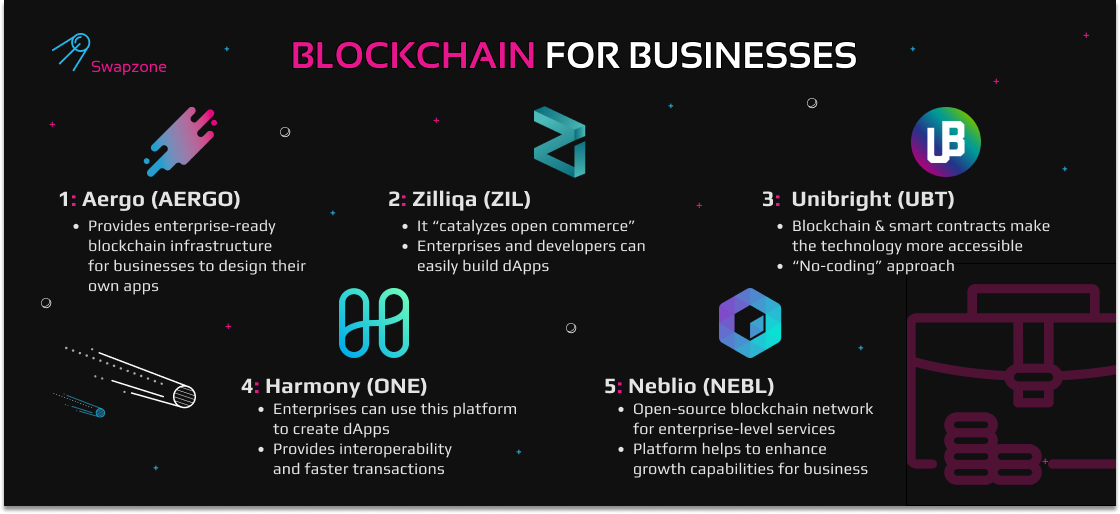Many enterprises and businesses globally are starting to realize that blockchain technology offers a faster, efficient, and secure way of doing business. However, every time businesses try to adopt and use blockchain technology, they face a number of significant obstacles. These obstacles in turn hinder blockchain technology from being mass adopted, which is a major problem for blockchain technology as a whole.
Some of these obstacles include a lack of reliability, technical difficulties during integration, privacy issues, scalability problems, difficulties in developing software, and interoperability constraints. In order to overcome some of these hurdles, a bunch of developers sat down and came up with different cryptocurrencies built for businesses. These cryptocurrencies have been dubbed “cryptocurrencies for enterprises”. So what exactly are cryptos for entrepreneurs? Let’s find out below.
![]()
What are cryptos for enterprises?
Cryptos for enterprises are basically cryptocurrencies that have been specifically designed to solve some of the hurdles that businesses face when trying to utilize blockchain technology. They make the process of blockchain adoption for businesses cheaper and easier.
Through them, businesses and enterprises can host a plethora of applications over the respective blockchains thus reducing their overall operational costs. For instance, both buyers and sellers can now cut out the middleman through the use of a P2P platform. The possibilities brought up by blockchain are literally endless. Let’s take a deep dive into some of the cryptocurrencies designed for businesses.

List of Cryptos for Enterprises
There are so many cryptocurrencies that are geared towards businesses in the industry. However, the 5 below stood out in their respective fields. Let’s take a closer look at each coin and what it aims to do for enterprises.
- Aergo (AERGO)
Aergo is an open-source 4th generation blockchain that was designed to mitigate the hurdles faced by businesses trying to leverage public blockchains. Its aim is to provide an enterprise-ready blockchain infrastructure that allows businesses to design and deploy their own blockchain applications on the AERGO network. They do this by creating a secure, fast, advanced, and friendly open ecosystem where businesses and third parties can connect and use. They keep it cost-friendly and time-effective to enable businesses to implement and adopt the technology. The platform’s native token is known as Aergo coin or Aergo token.

- Zilliqa (ZIL)
Zilliqa is described as a secure high-performance blockchain network designed for businesses with an aim of “catalyzing open commerce” through its smart contracts and low-cost transactions for cryptocurrencies. The platform’s native token is known as ZIL coin. Through the Zilliqa platform, enterprises and developers who wish to build dApps can do so without any hassles. Zilliqa uses a sharded architecture structure that’s geared towards solving the scalability limitation of blockchain. The aim of Zilliqa was to create a highly scalable platform that still retained some of the core blockchain principles such as decentralization.

- Unibright (UBT)
Unibright is a blockchain technology that utilizes blockchain and smart contracts to make the technology more accessible to companies. The platform’s native token goes by the ticker UBT. It’s referred to as Unibright coin or UBT coin. Unibright’s main agenda is to make blockchain more accessible through their “no-coding” approach. Companies wanting to use Unibright don’t have to have blockchain skills, smart contract development skills, or even software development knowledge.

- Harmony (ONE)
You might be wondering, “What is ONE coin?” Harmony coin, commonly referred to as ONE coin cryptocurrency, is Harmony’s native token. Harmony is a blockchain platform that enterprises can use to create dApps. Through the use of sharding technology, Harmony is looking to get rid of the structural limitations of the previous blockchain (Ethereum) and open doors for interoperability and faster transactions. Both Ethereum and Harmony use the Solidity programming language. Therefore, building a dApp on Harmony will feel exactly the same as building a dApp on Ethereum.

- Neblio (NEBL)
Neblio is an open-source blockchain network that’s designed for enterprise-level services and applications. It uses a PoS algorithm that secures the network through staking NEBL coin. The Neblio coin is the platform’s native token. Neblio tokens can be used for P2P transactions within the Neblio ecosystem. The NEBL cryptocurrency has created a mature platform where businesses can enhance and leverage their capabilities to grow in their respective businesses.

How to use these cryptos in the right way?
To determine whether or not your business can leverage these cryptocurrencies and use them in the right way, there are a few questions that you need to ask yourself. These questions will help you make the best choice that fits your business objectives. They include:
- What do I want to achieve by using these cryptos?
- What adjustments do I foresee in anticipation of incorporating these cryptocurrencies into my day-to-day operations?
- As a business can we possibly invest in these cryptocurrencies as a new asset class?
- Will my business maintain custody of these cryptocurrencies or outsource them to a third-party entity?
With that said, let’s explore some of the benefits and drawbacks of adopting these cryptocurrencies into your enterprise in the next section.
Pros and Cons of $AERGO, $ZIL, $UBT, $ONE, and $NEBL
Pros |
Cons |
|
Security |
Volatility |
| The majority of these coins are created on a blockchain network which means that they are immune to hacks and frauds. Some utilize the PoW consensus algorithm, others the PoS consensus algorithm, and others a hybrid system. Therefore, security is guaranteed. | Even though these cryptocurrencies are starting to see some growth thanks to gaining more awareness, the coins are still volatile. Additionally, there’s the possibility that these coins can experience a downward price trend in the long term. |
|
Immutability |
High Competition |
| Since most of these cryptocurrencies are built on the blockchain, it means that they provide a decentralized and secure ledger that can be used to store any kind of record. Thanks to the decentralized nature of blockchain, any records on the blockchain remain immutable. Additionally, since the blockchain is immutable, unaltered and accurate information can be accessed for verification or audit purposes. | There is major competition within the cryptocurrency industry from other coins to provide similar solutions. Not to mention, outside competition from traditional enterprise service providers who are offering the same products. |
|
Scalability |
|
| A few of these cryptocurrencies such as Harmony and Zilliqa take advantage of sharding technology that helps solve the scalability problem of most public blockchains. Therefore, a lot more transactions can be processed every second. | |
|
Talented Teams |
|
| These cryptocurrencies have strong teams and large communities of followers. This means that the teams behind these cryptocurrencies are working hard to provide something that’s in high demand. The large community following shows that individuals and enterprises are ready to utilize blockchain and integrate it into their businesses. |
How to exchange cryptos for enterprises?
If you are looking for the best Harmony ONE exchange, Neblio coin exchange, Unibright exchange, Aergo exchange or ZIL exchange Swapzone is the best option for you. Here’s how you can easily exchange any of the cryptos above on Swapzone:
- Head to Swapzone.
- Find the “select pair” tab and choose the cryptocurrency and the amount of it that you wish to exchange.
- In the “Get up to” section, select the cryptocurrency that you want, whether Neblio, Harmony, AERGO, Unibright, or Zilliqa.
- Once you’ve entered all your details in the respective tabs, you will see the different offers being displayed on Swapzone.
- Go through the different exchange rate offers and pick the one that you want.
- Click on “proceed to exchange” to complete the transaction.
- Wait for the transaction to be processed and for the deposit to be sent into your wallet.
- Once the transaction is complete, rate and review the exchange partner. Your token exchange is complete.


